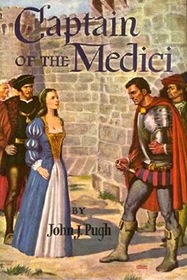[Dust Jacket Summary]
As he sat in the Black Ram, young Pietro Lucca, the blacksmith's son who had risen to a captain in the Bande Nere, reflected bitterly on the strange turns of Fortune's wheel. Florence in the sixteenth centuryheld many pleasures for one like himself: her wines were sweet, her art exquisite, her women beautiful. But while la bella Fiorenza pursued her gaudy round of delight, the penniless Black Band under General de' Medici fought to the death against the Spanish invaders. And if the Pope would not give enough money -- the thought sent Pietro in search of his beloved Cia, in whose arms he could forget for a moment his wounded general, his ragged comrades-in-arms, his uncertain mission to Rome.
But in the Eternal City, Baccio Valori, and not Pope Clement, received Pietro. Standing at the other end of a long, polished table, Valori spoke of rich "gifts" from Spain, and rolled between his thick, soft fingers a parchment that spelled blackmail.
With Giovanni's death Pietro was made lord of Aquila del Monte, his general's castle in Tuscany. Only then did he find the strength and the opportunity to ease his heart's self-contempt; when the Spaniards marched confidently into the narrow mountain pass beneath Aquila, Pietro was the "eagle" that dived to the attack. And at the height of battle, as he crossed swords with the son of Valori, the part of Michelangelo worked into another miracle -- a miracle that bore the brave Tuscans on a mighty wave to victory. Yet as he watched the smoke drift from the silent cannon, Pietro Lucca knew he had not seen the last of the Valoris.
Riding high on adventure and romance, Pietro and Florence were to share the fate that ruled the Renaissance itself. Cruel, exuberant, corrupt, devoted to the sacred, yet discovering anew the joys of the profane, the Renaissance mixed gunsmoke with incense, loyalty with treason. To Pietro it brought vengeful enemies, entertainment in the torture room, love, despair and great victories. To Florence it brought easy riches and rank dishonour, the plunder of unscrupulous nobles and a soldering rabble -- and the gusto to survive them all.
As he sat in the Black Ram, young Pietro Lucca, the blacksmith's son who had risen to a captain in the Bande Nere, reflected bitterly on the strange turns of Fortune's wheel. Florence in the sixteenth centuryheld many pleasures for one like himself: her wines were sweet, her art exquisite, her women beautiful. But while la bella Fiorenza pursued her gaudy round of delight, the penniless Black Band under General de' Medici fought to the death against the Spanish invaders. And if the Pope would not give enough money -- the thought sent Pietro in search of his beloved Cia, in whose arms he could forget for a moment his wounded general, his ragged comrades-in-arms, his uncertain mission to Rome.
But in the Eternal City, Baccio Valori, and not Pope Clement, received Pietro. Standing at the other end of a long, polished table, Valori spoke of rich "gifts" from Spain, and rolled between his thick, soft fingers a parchment that spelled blackmail.
With Giovanni's death Pietro was made lord of Aquila del Monte, his general's castle in Tuscany. Only then did he find the strength and the opportunity to ease his heart's self-contempt; when the Spaniards marched confidently into the narrow mountain pass beneath Aquila, Pietro was the "eagle" that dived to the attack. And at the height of battle, as he crossed swords with the son of Valori, the part of Michelangelo worked into another miracle -- a miracle that bore the brave Tuscans on a mighty wave to victory. Yet as he watched the smoke drift from the silent cannon, Pietro Lucca knew he had not seen the last of the Valoris.
Riding high on adventure and romance, Pietro and Florence were to share the fate that ruled the Renaissance itself. Cruel, exuberant, corrupt, devoted to the sacred, yet discovering anew the joys of the profane, the Renaissance mixed gunsmoke with incense, loyalty with treason. To Pietro it brought vengeful enemies, entertainment in the torture room, love, despair and great victories. To Florence it brought easy riches and rank dishonour, the plunder of unscrupulous nobles and a soldering rabble -- and the gusto to survive them all.




